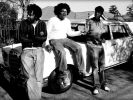Eye For Film >> Movies >> Bunny Chow (2006) Film Review
The whole story begins when the writing team behind a successful South African comedy sketch show for television (The Pure Monate Show) fail to secure funding for two features that they have written, and so decide instead just to go out and shoot a different, low-budget film about some black stand-up comedians (essentially themselves) going to perform at a rock festival for a primarily white audience. They can afford only to shoot guerilla-style at the Oppikoppi festival (due to take place in just four weeks), improvising their way through the barest of scene outlines and hoping that all their rough material can be shaped into something serviceable in post-production (with non-festival sequences to be shot and added later). Their financial backers pull out the night before shooting is to commence, but personal bank accounts are raided, and the show goes on.
All of which sets up John Barker's Bunny Chow to be the archetypal underdog story. We want this labour of love to be the next Apocalypse Now or Fitzcarraldo - a film whose mad production history mirrors and complements the finished work. We want the film to stick it to the man the same way the filmmakers did. We want to see something fresh and funny emerge triumphant from so much adversity. Unfortunately, though, what we get instead is a rather aimless, amateurish and unengaging ensemble piece, boasting some of South Africa's most cutting edge comic talents and yet still rarely raising as much as a laugh. Perhaps it is just a case of a nation's humour failing to cross borders - but if so, then perhaps too the film might better never have travelled abroad.

Dave (David Kibuuka) is a dishwasher trying - and mostly failing - to find his voice as a stand-up. Kags (Kagiso Lediga) is a more successful comic who divides his time between reassuring his girlfriend Kim (Kim Engelbrecht) that she is 'the one', and sleeping with any other woman who will have him. Joey (Yusuf Rasdien) is a Muslim comedian who endlessly annoys his girlfriend Angela (Angela Chow) with his struggles over his faith. Together these three friends and white wanderer Cope (Jason Cope) will set off from Johannesburg on a roadtrip to Oppikoppi, where they will all unexpectedly be faced with some home truths.
Named for a South African communal dish consisting of bread stuffed with an assortment of meats and vegetables, Bunny Chow is certainly a mélange of the different ages, classes, races and religions that make up contemporary South Africa's hotpot - and there is no shortage of unlikely encounters and oddball events either in the film, from a philandering run-in with gun-toting Aryan homophobes to a drug deal with two dreadlocked comedy stoners, from an unexpected pregnancy to a trip sequence, and even an argument about geopolitics between a Muslim and a Jew. And yet what might sound vibrant or at least quirky on paper just ends up falling very flat on screen, as Dave's status as failed comedian pervades the feel of the whole film.
Shot handheld in black and white, with a rich soundtrack by various local artists, Bunny Chow certainly affects the tropes of street-level cinema, in one early scene even evoking a specific sequence from La Haine (a guy mixing records live on the balcony of an urban apartment building). In a sense, though, that is half the problem: the film's style, far from seeming authentic or raw, feels studied and self-conscious. This is fanboy filmmaking, as seems to be confirmed when a friend of one of the three comics keeps name-dropping his favourite Park Chan-wook film with gratuitous zealotry.
"Just watch Oldboy", he insists - and many viewers may find themselves wishing that they were doing just that instead. For while the absence of AIDS or post-apartheid angst might make Bunny Chow a somewhat refreshing addition to the body of new South African cinema, it is still the kind of misfiring act that leaves you wanting to heckle rather than cheer.
Reviewed on: 29 Jan 2008
















